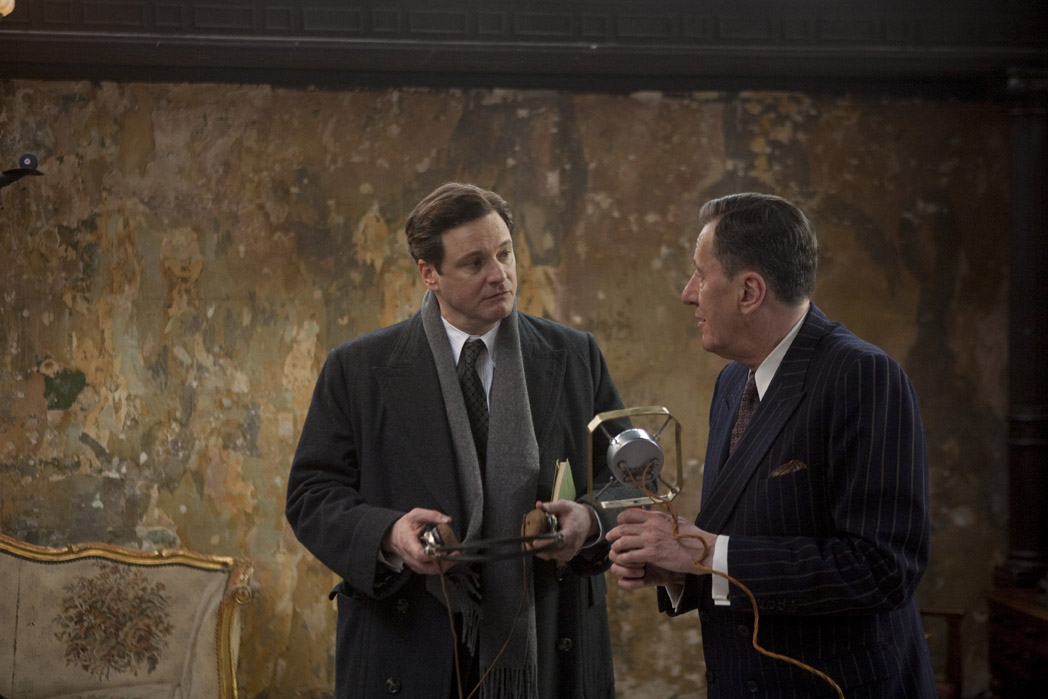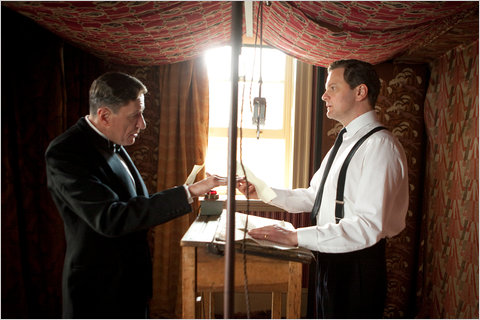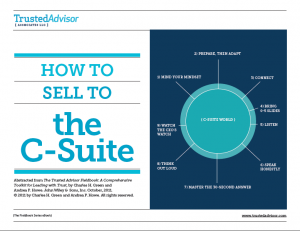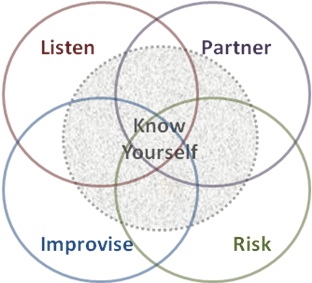 Datapoint 1. Maybe you’ve seen the Oscar-winning The King’s Speech by now. Certainly you’ve read about it.
Datapoint 1. Maybe you’ve seen the Oscar-winning The King’s Speech by now. Certainly you’ve read about it.
Datapoint 2. If you’re reading this blog, you probably know I’m the co-author of The Trusted Advisor (with David Maister and Rob Galford).
There is a connection between those two datapoints. But it took executive coach Paul Rutherford to make the case.
The Movie and the Book
Rutherford—former Comms director at Xerox–wrote a blogpost—Advice Fit For a King–linking the movie and The Trusted Advisor that is so good, I’m embarrassed I didn’t think of it myself.
He suggests that the movie brought to life (in ways that a book could never do) some of the key principles we had articulated as being critical to a trusted advisor. Specifically:
- Trusted advisors are consistent
- Creating intimacy takes courage
- Illustrate, don’t tell
- Earn the right to offer advice
- Focus on the client as an individual, not as someone filling a role
- Be sure your advice is being sought
- When you need help, ask for it
- Just because the client asks a question doesn’t mean it’s the right question to answer.
Rutherford cites moments in the movie to illustrate each of these points. I’m beginning to think the screenwriters had read our book!
Credit where credit is due. If you’re online, click through to read Advice Fit for a King on Rutherford’s site, so he gets the traffic numbers. If that’s not feasible for you, then I have—with his permission—reprinted it below. Rutherford’s twitter handle, should you choose to give him a shout-out publicly, is @ruthertweet.
Paul, many thanks for such an insightful movie-cum-book review.
—————
Advice Fit For a King
(quoted with permission from Paul Rutherford)
Like lost car keys, learning can turn up in the most unexpected places.
After a recent workshop on Client leadership, I’ve been reading The Trusted Advisor by Maister, Green and Galford. It’s a comprehensive, well-structured handbook aimed at those in professional services who need to build and reinforce their business relationships.
Brimming with anecdotes, checklists and ‘how to’ tips, it’s thorough and full of examples. Almost too thorough; no matter how many notes I made, and key paragraphs I underlined, it wasn’t sticking. It’s one of the shortcomings inherent in the ‘handbook’ form – I needed something to make it come alive.
Then yesterday I went to see The King’s Speech.
Movie Masterclass
Geoffrey Rush plays Lionel Logue, the Australian speech therapist who helped Prince Bertie, the Duke of York (Colin Firth) – and second son of King George V – to overcome a debilitating stammer. To make matters worse, his elder brother (David aka Edward VIII) abdicated the throne to marry a divorcee, and Bertie became King on the eve of WW2 – at the time when the country needed a clear voice of leadership.
Like all great pieces of entertainment, it’s a movie that works on multiple levels: It’s the story of a man trying to conquer his daemons. It’s the portrait of a leader struggling to step up to his role. It’s a study of class and social hierarchy. It’s an essay on the impact of radio broadcasting on politics and society.
And it’s a masterclass in becoming a trusted adviser. Here are eight scenes from David Seidler’s original screenplay that beautifully illustrate many of the principles in Maister’s book:

1. “Trusted Advisers are consistent”
It is Bertie’s wife, Elizabeth, who first approaches Lionel about treating her husband. She does so under the pseudonym of Mrs Johnson. He is direct and to-the-point with her:
LIONEL: Where’s Mr Johnson?
ELIZABETH: He doesn’t know I’m here.
LIONEL: That’s not a promising start
He tells her to have hubby ‘pop by’ to give his personal history. She says “you must come to us.”
LIONEL: Sorry, Mrs J, my game, my turf, my rules
ELIZABETH: And what if my husband were the Duke of York?
The penny drops for Lionel, but not his faith in his method and his success rate:
LIONEL: I can cure your husband. But for my method to work there must be trust and total equality in the safety of my consultation room. No exceptions.
It’s a testament to Helena Bonham Carter’s performance that you can see the relief in her face. Here is an adviser that is different, confident and will not make exceptions. Whether addressing commoner or royalty, he takes the same approach.
2. “Be not afraid. Creating intimacy takes courage.”
Obviously, this could be a flagship Client for Lionel; in that era, the gravitational pull of deference would have been immense. But his method – his advice – is based upon a relationship of equals, which he makes very clear to Bertie when they first meet.
LIONEL: I was told not to sit too close. I was also told, speaking to a Royal, one has to wait for the Royal to choose the subject.”
Cleverly, Lionel is already chipping away at the protocol; even Bertie acknowledges, with difficulty, that with him it could be a ‘rather long wait’. It’s a light moment before the inevitable conflict arises as the Adviser tries to map out his territory, focusing on facts:
LIONEL: When did the defect start?
BERTIE: It’s always been that way.
LIONEL: I doubt that.
BERTIE: Don’t tell me! It’s my defect.
LIONEL: It’s my field. I assure you, no infant starts to speak with a stammer.
After setting out his stall – he is the expert – he goes on to provoke Bertie, because it breaks down barriers and is part of the solution; Bertie doesn’t stammer when he’s angry. It’s hardly likely to be part of a B2B Client engagement strategy, but it’s a memorable reinforcement of the need to be brave in the face of defensive aggression.

3. “Illustrate, don’t tell.”
After provoking his potential Client, Lionel sets him an exercise to record his voice (if you haven’t seen the film, I’ll spare you the details). The session ends frostily, with Bertie saying that the treatment is not for him.
However, in a scene shortly after, Bertie listens to the recording, and realises that Lionel’s methods – or at least his approach – can yield results.
No one has told him this, it’s not on a testimonial. He has first hand, personal evidence of success.
4. “Earn the right to offer advice”
When Bertie returns to trial Lionel’s methods, the Royal couple set out their terms:
BERTIE: Strictly business. No personal nonsense.
ELIZABETH: I thought I’d made that very clear in our interview?
Lionel points out that the couple’s request will result in dealing with the issue at surface level, and is told that it will suffice. So rather than be precious, he agrees to focus on breathing techniques, physical exercise and tongue twisters. We know that it won’t address the core problem, but this is Lionel’s first steps in forming the relationship. He is earning the right to go further.

5. “Focus on the client as an individual, not as someone who is filling a role.”
Halfway through the film, Bertie’s father (King George V) dies. When Client and Adviser meet soon after, the conversation extends beyond the prescribed boundaries. As is his duty, Bertie has been presenting a formal face to the world, so he treats the meeting with Lionel as a form of release. Lionel learns much about his background, his upbringing, his relationship with his parents and his siblings – much of it the root causes of his impediment.
BERTIE: You know, Lionel, you’re the first ordinary Englishman…
LIONEL: Australian.
BERTIE: I’ve ever really spoken to.
Of course, the subtext is that Lionel is the first person that Bertie has spoken to about these issues. Lionel has now reached the status of Trusted Adviser.
6 “BE SURE YOUR ADVICE IS BEING SOUGHT.”
The next time Bertie and Lionel meet, the prince is very angry with his elder brother. David is intent of marrying Mrs Simpson, a divorcee, so putting heart before duty. If it happens, Bertie will become King.
BERTIE: I am not an alternative to my brother.
LIONEL: If you had to, you could outshine David…
Lionel reaches out and gives Bertie a pat of comfort on the shoulder. Bertie pulls back in offended shock.
BERTIE: Don’t take liberties! That’s bordering on treason.
LIONEL: I’m just saying you could be King. You could do it!
BERTIE: That is treason.
They face each other, as though in combat.
LIONEL: I’m trying to get you to realise you need not be governed by fear.
BERTIE: I’ve had enough of this.
LIONEL: What are you afraid of?
BERTIE: Your poisonous words.
Bertie strides away, leaving Lionel to realise that he is no longer adviser to the man who is likely to be King.
It’s a brilliant scene, both dramatically and as illustration of a key point in Client intimacy. No matter how close the relationship becomes, there will always be areas that are off limits. Here, advice should only be given when invited.
7. “When you need help, ask for it.”
Events turn in the drama, leading to a reconciliation between Bertie and Lionel. This happens at Lionel’s home, where he is visited by the royal couple while his wife is out playing bridge. Which is just as well, as Lionel has not told her of his ‘star’ Client.
Unfortunately, she returns home early, and finds Elizabeth in the dinning room. Bertie and Lionel are in the parlour, in a scene that reveals the latter’s vulnerability:
BERTIE: Logue, we can’t stay here all day.
LIONEL: Yes we can.
BERTIE: Logue…
LIONEL: Look, I need to wait for the opportune moment.
BERTIE: (realising) You’re being a coward!
LIONEL: You’re damn right.
Decisive, Bertie stands and throws open the door.
BERTIE: Get out there, man!
And so the adviser is advised.
8. “Just because the client asks a question, doesn’t mean it’s the right question to answer.”
Bertie’s coronation is the first major test of Lionel’s methods. He attends the preparations at Westminster Abbey, and gets a very cold reception from the Archbishop of Canterbury, who takes an exception to this antipodean outsider. In the following scene, it’s obvious that ‘the establishment’ has done some digging into Lionel’s past, which they have fed to Bertie.
BERTIE: True, you never called yourself ‘Doctor’. I did that for you. No diploma, no qualifications. Just a great deal of nerve.
How does Lionel respond? By pointing out that when he was developing his methods (to help shell-shocked soldiers returning from the Great War) there was no training. He admits that he has no piece of paper, but asks Bertie to focus on his track record of results, and what they have achieved together.
*****
I’ll stop at this point rather than spoil the end for those who haven’t yet seen The King’s Speech. I hope this post encourages you to do so, both as an emotionally charged historical biopic and as an object lesson in building Client relationships.
Maister et al say of the trusted advisor role: “… virtually all issues, personal and professional are open to discussion and exploration. The trusted advisor is the person the Client turns to when an issue first arises, often in times of great urgency: a crisis, a change, a triumph, or a defeat.”
For any of us hoping to build such a relationship, there’s plenty to learn from Lionel Logue.
 We’re pleased to announce the release of our latest ebook: How to Sell to the C-Suite (pdf).
We’re pleased to announce the release of our latest ebook: How to Sell to the C-Suite (pdf).
 Thurs. Aug. 25th Global Sandy Styer
Thurs. Aug. 25th Global Sandy Styer Late in the year 2000,
Late in the year 2000,  A competency model won’t answer the mail when it comes to building trustworthiness—in fact,
A competency model won’t answer the mail when it comes to building trustworthiness—in fact,  Datapoint 1. Maybe you’ve seen the Oscar-winning
Datapoint 1. Maybe you’ve seen the Oscar-winning 



 What profession do you think has the most ultimate trusted advisors per capita? Consultants? Doctors? Financial planners? I now know where my vote goes. PICU nurses.
What profession do you think has the most ultimate trusted advisors per capita? Consultants? Doctors? Financial planners? I now know where my vote goes. PICU nurses. You probably want your customers to trust you. And you probably tell them the truth about why they should buy from you.
You probably want your customers to trust you. And you probably tell them the truth about why they should buy from you. Trust takes time. It’s one of those things we say without examination. Turns out it’s largely a myth.
Trust takes time. It’s one of those things we say without examination. Turns out it’s largely a myth..jpg) Join us this Fall at one or more of our 2010 TrustedAdvisor Associates events in McLean, VA; Livingston, NJ; and through globally accessed webinars! Topics include "How Smart Companies Make the Sale."
Join us this Fall at one or more of our 2010 TrustedAdvisor Associates events in McLean, VA; Livingston, NJ; and through globally accessed webinars! Topics include "How Smart Companies Make the Sale."